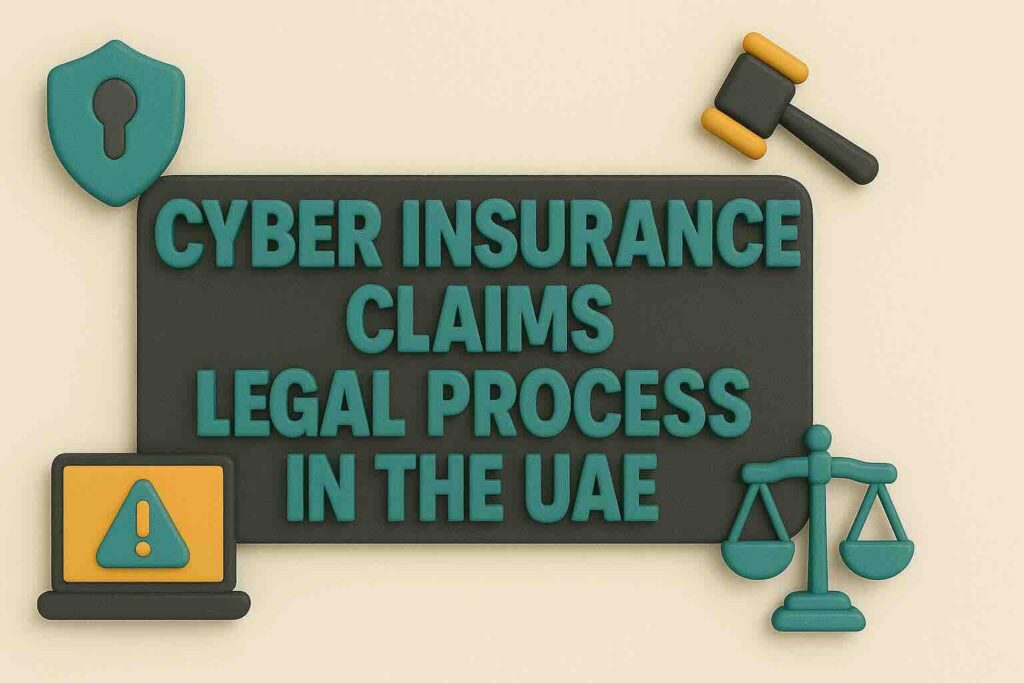The UAE’s rapidly evolving digital landscape has made cyber insurance claims increasingly complex, requiring businesses to navigate a sophisticated legal framework that combines federal insurance laws, regulatory oversight, and specialized dispute resolution mechanisms. As the cyber-insurance market develops in the UAE with increased addition of cyber coverage to traditional policies, the new Federal Law No. 48 of 2023 has established the Banking and Insurance Dispute Resolution Unit (BIDRU) as an independent legal body for handling insurance complaints. This comprehensive guide provides UAE businesses with essential insights into the cyber insurance claims legal process, ensuring compliance with current regulations and maximizing claim success rates in 2025.
Understanding UAE’s Cyber Insurance Legal Framework
Current Regulatory Environment
The UAE’s cyber insurance sector operates under a robust regulatory framework designed to protect both insurers and policyholders. With 2025 set to be a game-changer for the MENA region, legal and regulatory shifts from 2024 continue to reshape the economic landscape, particularly in insurance dispute resolution and cybersecurity compliance.
The regulatory foundation includes Federal Law No. 48 of 2023, which revolutionized insurance dispute resolution by establishing BIDRU as the primary authority for insurance-related complaints. This specialized unit ensures that cyber insurance claims receive expert attention from professionals who understand both insurance law and cybersecurity complexities.
UAE businesses must also comply with the Emirates’ comprehensive cybersecurity standards, which directly impact cyber insurance eligibility and claims processing. UAE’s evolving cybersecurity standards require AI, cloud security, and proactive strategies to help businesses thrive in 2025.
Key Legal Provisions Affecting Cyber Insurance Claims
The legal framework governing cyber insurance claims in the UAE encompasses several critical areas:
Federal Insurance Law Compliance: All cyber insurance policies must adhere to UAE federal insurance regulations, including specific provisions for digital assets, data protection, and business interruption coverage. Insurance companies must clearly define coverage terms for cyber incidents, including ransomware attacks, data breaches, and system compromises.
Data Protection Obligations: Policyholders must demonstrate compliance with UAE data protection laws when filing claims. This includes maintaining appropriate security measures, conducting regular security assessments, and implementing incident response procedures that align with regulatory requirements.
Notification Requirements: UAE law mandates specific notification timelines for cyber incidents. Businesses must report cyber incidents to relevant authorities while simultaneously notifying their insurance providers within prescribed timeframes to maintain claim validity.
The Cyber Insurance Claims Process in the UAE
Initial Claim Filing Requirements
Filing a cyber insurance claim in the UAE requires meticulous documentation and adherence to specific procedural requirements. The process begins with immediate incident notification, typically within 24-48 hours of discovering a cyber incident.
Essential Documentation: Successful cyber insurance claims require comprehensive documentation including incident reports, forensic analysis results, financial impact assessments, and evidence of compliance with policy terms. Businesses must maintain detailed records of their cybersecurity infrastructure, employee training programs, and incident response procedures.
Technical Evidence Gathering: Policyholders must preserve digital evidence while ensuring business continuity. This includes system logs, network traffic analysis, malware samples, and documentation of the attack vector. Professional forensic investigation reports often strengthen claim validity and expedite processing.
Financial Impact Assessment: Accurate quantification of losses is crucial for successful claims. This includes direct costs such as system restoration, forensic investigation fees, legal expenses, and indirect costs including business interruption, reputation damage, and regulatory compliance expenses.
Investigation and Assessment Procedures
Insurance companies conduct thorough investigations of cyber insurance claims to verify coverage eligibility and assess the extent of damages. This process involves multiple stakeholders and can significantly impact claim outcomes.
Third-Party Forensic Analysis: Most UAE insurers require independent forensic investigations to determine the cause, scope, and impact of cyber incidents. These investigations must be conducted by certified cybersecurity professionals who can provide court-admissible evidence if disputes arise.
Coverage Verification: Insurers meticulously review policy terms against the specific incident circumstances. This includes analyzing whether the incident meets policy definitions of covered events, whether all policy conditions were met at the time of the incident, and whether any exclusions apply.
Business Impact Evaluation: Comprehensive assessment of business disruption includes analyzing operational downtime, revenue loss, additional expenses incurred during recovery, and long-term business impact. Insurers often require detailed financial records and business continuity documentation.
Common Challenges in Cyber Claims Processing
UAE businesses frequently encounter specific challenges when processing cyber insurance claims, many of which can be mitigated through proper preparation and understanding of legal requirements.
Policy Interpretation Disputes: Cyber insurance policies often contain complex technical language that can lead to interpretation disputes. Common areas of disagreement include the definition of “cyber incident,” coverage scope for third-party costs, and exclusions for specific types of attacks or negligent security practices.
Causation and Attribution Issues: Establishing clear causation between cyber incidents and claimed damages can be challenging, particularly when multiple factors contribute to business losses. Insurers may question whether losses directly result from the cyber incident or from underlying business vulnerabilities.
Regulatory Compliance Complications: Failure to maintain adequate cybersecurity measures or comply with regulatory requirements can impact claim validity. UAE businesses must demonstrate ongoing compliance with cybersecurity standards and data protection regulations.
Legal Dispute Resolution Mechanisms
BIDRU Dispute Resolution Process
Under the new Federal Law No. 48 of 2023, the Banking and Insurance Dispute Resolution Unit (BIDRU) serves as an independent legal body tasked with handling complaints lodged against insurance companies. This specialized unit provides expert dispute resolution services specifically designed for insurance-related conflicts.
Jurisdiction and Authority: BIDRU has comprehensive jurisdiction over cyber insurance disputes involving UAE-licensed insurance companies. The unit can hear cases involving policy interpretation, claim denial, settlement disputes, and coverage disagreements. The DR Committee considers insurance disputes of all classes and types arising from complaints made by an insured, beneficiary or affected person against an insurance company incorporated in the UAE.
Filing Requirements: Parties must exhaust direct negotiation attempts before approaching BIDRU. The filing process requires comprehensive documentation including the insurance policy, claim correspondence, expert reports, and evidence supporting the dispute. Filing fees and procedural requirements vary based on claim value and complexity.
Resolution Timeline: BIDRU aims to resolve insurance disputes within specific timeframes, though complex cyber insurance cases may require extended investigation periods. The unit provides regular status updates and facilitates communication between parties throughout the resolution process.
Alternative Dispute Resolution Options
Beyond BIDRU, UAE businesses have access to various alternative dispute resolution mechanisms for cyber insurance disputes.
Mediation Services: Professional mediation offers confidential, cost-effective resolution of cyber insurance disputes. Mediators with cybersecurity and insurance expertise can help parties reach mutually acceptable settlements while preserving business relationships.
Arbitration Proceedings: International arbitration provides sophisticated dispute resolution for complex cyber insurance cases. UAE courts recognize and enforce arbitration awards, making this an attractive option for high-value disputes or cases involving international elements.
Expert Determination: Technical disputes involving cybersecurity issues, forensic analysis, or damage quantification may benefit from expert determination. Independent technical experts provide binding decisions on specific technical aspects of cyber insurance disputes.
Court Litigation Procedures
When alternative dispute resolution fails, UAE courts provide comprehensive litigation procedures for cyber insurance disputes.
Federal Court Jurisdiction: UAE courts have jurisdiction over insurance-related claims brought against UAE nationals and entities or foreign legal entities with a domicile or place of residence in the UAE. Federal courts handle complex commercial disputes involving substantial cyber insurance claims.
Evidence Requirements: Court proceedings require extensive documentation and expert testimony. Technical evidence must be presented through qualified cybersecurity experts who can explain complex technical concepts to legal professionals. Documentary evidence must be properly authenticated and translated when necessary.
Enforcement Mechanisms: UAE courts provide robust enforcement mechanisms for cyber insurance judgments. Successful claimants can pursue asset freezing orders, garnishment procedures, and international enforcement through bilateral treaties and conventions.
Compliance and Best Practices
Pre-Claim Preparation Strategies
Successful cyber insurance claims begin long before incidents occur. UAE businesses must implement comprehensive preparation strategies to ensure claim validity and maximize recovery potential.
Policy Review and Understanding: Regular policy reviews ensure businesses understand coverage scope, exclusions, and procedural requirements. Annual policy audits should assess whether coverage adequately reflects current business operations, technology infrastructure, and risk exposure.
Documentation Systems: Systematic documentation of cybersecurity measures, employee training, vendor management, and incident response procedures strengthens claim validity. Businesses should maintain detailed records of security investments, compliance activities, and risk management initiatives.
Incident Response Planning: Comprehensive incident response plans should integrate insurance notification requirements, evidence preservation procedures, and communication protocols. Plans must address coordination between internal teams, external counsel, forensic investigators, and insurance representatives.
During-Claim Management
Effective claim management during cyber incidents can significantly impact claim outcomes and recovery time.
Immediate Response Protocols: Businesses must balance incident containment with evidence preservation. Early coordination with insurers, legal counsel, and forensic investigators ensures proper evidence handling while minimizing ongoing damage.
Communication Management: Coordinated communication strategies prevent conflicting statements that could complicate claims processing. All external communications should be managed through designated spokespersons with appropriate legal and insurance guidance.
Vendor Coordination: Many cyber insurance policies include coverage for preferred vendors such as forensic investigators, legal counsel, and public relations firms. Early coordination with insurer-approved vendors can expedite claim processing and ensure coverage compliance.
Post-Claim Considerations
Effective post-claim management helps businesses strengthen their cybersecurity posture and prepare for future incidents.
Lessons Learned Integration: Comprehensive post-incident analysis should identify security gaps, procedural improvements, and policy adequacy issues. These insights should be integrated into updated security measures and insurance coverage assessments.
Regulatory Reporting: UAE businesses must ensure compliance with post-incident regulatory reporting requirements. This may include notifications to relevant authorities, customers, and business partners as required by applicable laws and regulations.
Insurance Coverage Updates: Cyber threats evolve rapidly, requiring regular insurance coverage assessments. Post-claim analysis often reveals coverage gaps or policy limitations that should be addressed during renewal negotiations.
Industry-Specific Considerations
Financial Services Sector
UAE financial institutions face unique cyber insurance challenges due to stringent regulatory requirements and high-value target status.
Regulatory Compliance Integration: Financial institutions must ensure cyber insurance policies align with Central Bank regulations, anti-money laundering requirements, and customer data protection obligations. Claims processing must consider regulatory notification requirements and potential enforcement actions.
Business Continuity Requirements: Financial services cyber insurance must address operational resilience requirements, including alternative processing capabilities, customer communication systems, and regulatory reporting continuity during cyber incidents.
Third-Party Risk Management: Banks and financial institutions must consider cyber risks from third-party service providers, payment processors, and technology vendors. Insurance coverage should address supply chain cyber risks and vendor-related incidents.
Healthcare and Life Sciences
Healthcare organizations face unique challenges related to patient data protection and regulatory compliance.
Patient Data Protection: Healthcare cyber insurance must address HIPAA-equivalent regulations in the UAE, patient notification requirements, and potential regulatory penalties. Claims processing must consider patient privacy protection throughout investigation and resolution procedures.
Medical Device Security: Healthcare institutions must address cyber risks from connected medical devices, electronic health records systems, and telemedicine platforms. Insurance coverage should specifically address medical device cyber incidents and patient safety considerations.
Research Data Protection: Life sciences companies must protect valuable research data, intellectual property, and clinical trial information. Cyber insurance policies should address industrial espionage, research disruption, and competitive intelligence theft.
Government and Public Sector
Government entities and public sector organizations face unique cyber insurance challenges related to national security and public service continuity.
Critical Infrastructure Protection: Organizations managing critical infrastructure must address cyber risks that could impact national security or public safety. Insurance coverage should consider emergency response coordination and government agency notification requirements.
Public Service Continuity: Government cyber insurance must address public service disruption, citizen data protection, and inter-agency coordination during cyber incidents. Claims processing should consider public transparency requirements and media management.
Sovereign Immunity Considerations: Government entities must navigate complex legal issues related to sovereign immunity, international law implications, and cross-border data sharing during cyber insurance claims processing.
Emerging Trends and Future Considerations
Artificial Intelligence and Machine Learning
The integration of AI and machine learning technologies creates new cyber insurance considerations for UAE businesses.
AI-Specific Risks: Businesses using AI systems face unique cyber risks including adversarial attacks, data poisoning, and model theft. Cyber insurance policies must evolve to address AI-specific vulnerabilities and attack vectors.
Automated Threat Detection: AI-powered cybersecurity systems generate vast amounts of data that can support cyber insurance claims. However, businesses must ensure these systems meet evidentiary standards and provide admissible documentation for claims processing.
Algorithmic Decision Making: AI systems involved in business operations create new liability considerations for cyber insurance. Policies must address potential claims arising from AI system failures, biased decision-making, or automated system compromises.
Cloud Computing and Digital Transformation
UAE businesses’ increasing reliance on cloud computing creates new challenges for cyber insurance claims processing.
Multi-Cloud Environments: Complex cloud architectures spanning multiple providers create jurisdictional and coverage complexity for cyber insurance claims. Businesses must ensure policies adequately address multi-cloud risks and provider-specific incidents.
Data Sovereignty Issues: Cloud data storage across international boundaries creates complex legal issues for cyber insurance claims. UAE businesses must consider data residency requirements and cross-border legal implications when processing claims.
Shared Responsibility Models: Cloud service provider shared responsibility models create coverage gaps that must be addressed through comprehensive cyber insurance policies. Claims processing must clearly establish responsibility boundaries between cloud providers and customers.
Quantum Computing Implications
The emergence of quantum computing technologies creates long-term considerations for cyber insurance in the UAE.
Cryptographic Obsolescence: Quantum computing advances threaten current encryption standards, requiring proactive insurance coverage for cryptographic system updates and potential data exposure from historical breaches.
Timeline Uncertainties: The uncertain timeline for quantum computing deployment creates challenges for long-term cyber insurance policy development and claims prediction modeling.
Regulatory Preparation: UAE businesses must monitor regulatory developments related to quantum-resistant cybersecurity standards and ensure insurance coverage evolves accordingly.
The cyber insurance claims legal process in the UAE requires sophisticated understanding of federal insurance law, regulatory compliance requirements, and specialized dispute resolution mechanisms. With the UAE’s data protection landscape expecting substantial growth over the next five years and the cyber insurance market forecast to grow at a CAGR of around 25.6% during 2023-28, businesses must proactively prepare for increasingly complex cyber insurance requirements.
Success in navigating UAE cyber insurance claims depends on comprehensive preparation, thorough understanding of legal requirements, and strategic coordination with qualified professionals including legal counsel, forensic investigators, and insurance specialists. The establishment of BIDRU as a specialized dispute resolution body provides UAE businesses with expert adjudication for insurance disputes while maintaining the option for alternative dispute resolution and court litigation when necessary.
As cyber threats continue to evolve and regulatory requirements become more sophisticated, UAE businesses must regularly assess their cyber insurance coverage, update their incident response procedures, and maintain comprehensive documentation systems. The integration of emerging technologies such as artificial intelligence, quantum computing, and advanced cloud architectures will require continuous adaptation of cyber insurance strategies and claims processing procedures.
The key to successful cyber insurance claims in the UAE lies in proactive preparation, comprehensive understanding of legal requirements, and strategic coordination with qualified professionals throughout the claims process. Businesses that invest in proper preparation and professional guidance are best positioned to navigate the complex legal landscape and achieve successful claim outcomes in the UAE’s rapidly evolving cyber insurance market.



